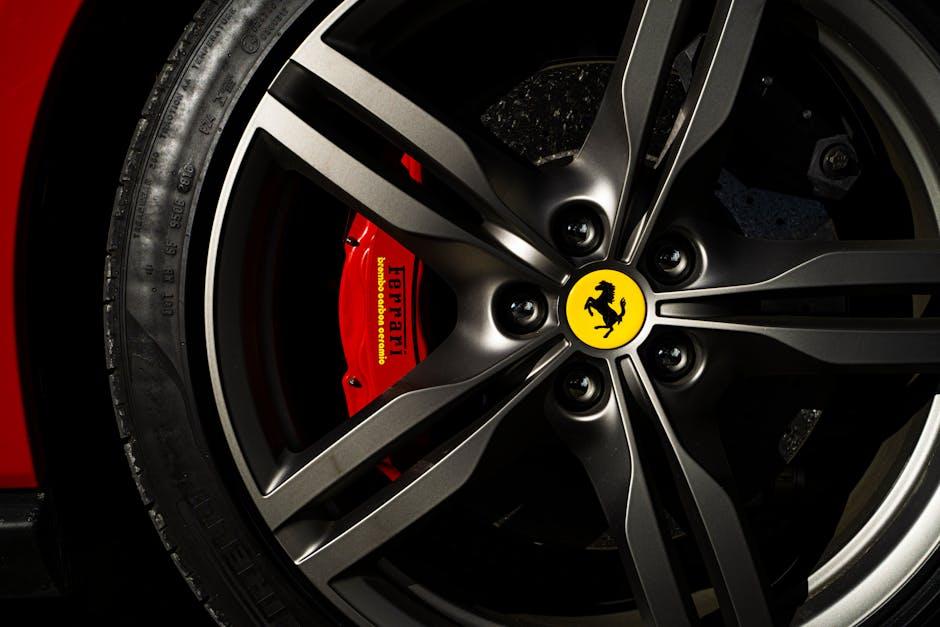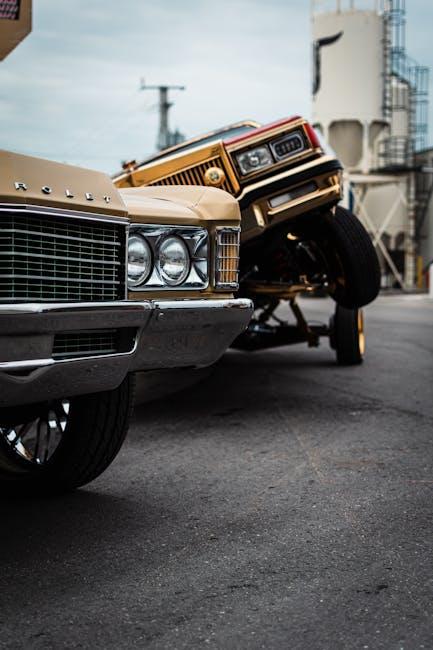There’s a language every car speaks—a subtle symphony of sounds that tells the story of its health and well-being. Some noises are mere background hums, the familiar soundtrack of your daily drive. But others? They’re urgent whispers or bold warnings, cries for attention that no driver should overlook. Understanding which car noises signal trouble can mean the difference between a minor fix and a costly repair, or even keeping you safe on the road. In this article, we’ll tune into these crucial cues, exploring the car noises you shouldn’t ignore and what they might mean for your vehicle’s future.
Table of Contents
- Common Engine Sounds That Signal Trouble
- Decoding Unusual Brake Noises and What They Mean
- The Warning Signs Behind Suspension Clunks
- When the Transmission Makes a Fuss
- Exhaust Rumbles That Demand Immediate Attention
- How to Identify and Act on Steering Squeaks
- Q&A
- In Conclusion

Common Engine Sounds That Signal Trouble
Every unexpected sound your engine makes is a story waiting to be decoded. A persistent knocking noise often points to issues with the combustion process, which could lead to serious engine damage if left unaddressed. Similarly, a high-pitched squeal when you turn the key or accelerate usually signals slipping belts or a failing tensioner, both of which can affect your car’s performance and longevity. Paying attention to these auditory signs can save you from costly repairs down the road.
Here are some common warning sounds to watch for:
- Rattling: Could indicate loose parts or a failing exhaust system.
- Hissing: Often a sign of a vacuum leak or overheating.
- Popping: May suggest issues with the fuel system or misfiring cylinders.
| Sound | Possible Cause | Suggested Action |
|---|---|---|
| Knocking | Detonation or worn engine parts | Visit mechanic ASAP |
| Squealing | Worn belts or pulleys | Inspect belts and replace if needed |
| Hissing | Coolant leak or vacuum issue | Check hoses and coolant level |

Decoding Unusual Brake Noises and What They Mean
When your brakes start producing strange noises, it’s a signal that your car is trying to communicate an underlying issue. A high-pitched squeal, often caused by worn brake pads, indicates metal is scraping against the rotor—an urgent call to action before damage escalates. A grinding sound is even more critical, usually meaning the brake pads are completely worn out, and metal is rubbing against metal, potentially jeopardizing your braking system’s integrity. Meanwhile, a thumping or rattling noise may point to loose components or warped rotors, which impact your car’s stopping power and safety.
To help you quickly identify these sounds, here’s a quick guide:
- Squealing: Worn brake pads or dust on the rotor
- Grinding: Worn-out pads exposing metal; urgent brake repair needed
- Thumping/Rattling: Loose caliper or warped rotor
- Clicking: Foreign objects trapped or loose brake hardware
| Brake Noise | Possible Cause | Recommended Action |
|---|---|---|
| Squeal | Worn pads, dust buildup | Inspect and clean pads; replace if needed |
| Grinding | Metal-on-metal contact | Replace brake pads immediately |
| Thumping | Warped rotor or loose parts | Check rotor condition and tighten components |

The Warning Signs Behind Suspension Clunks
When your suspension starts to emit clunks, it’s a subtle but urgent message from your car that something is amiss. These noises usually stem from worn-out bushings, loose shock absorbers, or even damaged ball joints. Ignoring these sounds can lead to compromised handling, uneven tire wear, and, ultimately, expensive repairs. Pay attention to when the clunks occur—whether it’s over bumps, during turns, or braking—as this can help pinpoint the root cause.
Here are some telltale signs to watch for:
- Frequent clunks on rough roads—likely indicating deteriorated bushings.
- Clunk sounds when turning—possibly a sign of worn ball joints or tie rods.
- Noise when braking or accelerating—could signal loose or broken struts.
| Source of Clunk | Common Cause | Recommended Action |
|---|---|---|
| Shock Absorber | Leak or loose mount | Inspect and replace as needed |
| Control Arm Bushing | Worn or cracked | Replace bushings promptly |
| Ball Joint | Excessive wear | Professional diagnosis & repair |

When the Transmission Makes a Fuss
When your car’s transmission starts acting up, the signs are often unmistakable and impossible to ignore. Sudden clunks, whining noises, or a grinding sensation when shifting gears signal that the transmission system might be struggling. Ignoring these sounds could lead to more severe problems and costly repairs. Keep an ear out for:
- Whining or buzzing sounds while driving, hinting at worn bearings or low transmission fluid.
- Grinding noises during gear changes, which could indicate clutch or gear synchronizer issues.
- Clunking or banging when shifting from park to drive, a red flag for transmission mounts or internal damage.
Early diagnosis is key to preventing complete transmission failure. If these symptoms pop up, consider this quick checklist of transmission fluid conditions and what they might mean:
| Fluid Color | Possible Issue | Action |
|---|---|---|
| Bright Red | Healthy and fresh | Monitor and maintain |
| Dark Brown or Black | Overheated or burnt | Flush and replace fluid immediately |
| Cloudy or Milky | Water contamination | Professional inspection required |

Exhaust Rumbles That Demand Immediate Attention
When your car’s exhaust starts to put on a symphony of unexpected rumbles, it’s rarely just a case of a “cool new sound.” These low, growling noises often indicate problems ranging from a loose muffler to exhaust leaks, both of which can seriously affect your vehicle’s performance and safety. Ignoring these symptoms can lead to increased fuel consumption, harmful fumes entering your cabin, or worse—costly damage to your catalytic converter.
Keep an ear out for these warning signs:
- Consistent deep rumbling: Often a sign of a failing muffler or a hole in the pipe.
- Irregular starts and stops in the noise: Could point to a cracked exhaust manifold.
- Vibrations accompanying the rumble: Potential loose hangers or mounts keeping your exhaust secure.
| Symptom | Possible Cause | Urgency Level |
|---|---|---|
| Deep rumble on acceleration | Damaged muffler | High |
| Intermittent popping sound | Exhaust leak | High |
| Vibration under car | Loose exhaust hangers | Medium |

How to Identify and Act on Steering Squeaks
When your steering wheel emits a high-pitched squeak, it’s often a subtle cry for attention that shouldn’t be ignored. These sounds typically arise from worn-out or improperly lubricated components within the steering system, such as the power steering pump, belt, or even the steering column itself. To pinpoint the issue, pay attention to when the noise occurs—whether during turning at low speeds, accelerating, or when the wheel returns to center. Arm yourself with a checklist of symptoms:
- Squeaking in tight turns indicates possible fluid issues or belt slippage.
- Persistent noise when driving straight could signal worn bearings or steering column bushings.
- Intermittent sounds triggered by temperature changes may suggest lubricant degradation.
Once identified, addressing steering squeaks promptly helps alleviate further wear and ensures safe vehicle control. A quick lubricant application might solve minor squeaks, but more persistent sounds often require professional inspection. Here’s a simple guide to your next steps:
| Symptom | Likely Cause | Recommended Action |
|---|---|---|
| Squeak during low-speed turns | Low power steering fluid or worn pump | Check fluid levels; replace pump if needed |
| Constant squeak while driving | Dry or damaged steering column bushings | Inspect and lubricate or replace bushings |
| Noise after long parking | Dried lubricants on components | Apply steering-safe lubricant |
Q&A
Q&A: Car Noises You Shouldn’t Ignore
Q1: Why is it important to pay attention to unusual car noises?
A: Your car’s noises are like its language—it uses sounds to tell you when something’s wrong. Ignoring these signals can lead to bigger, costlier problems or even safety hazards on the road.
Q2: What does a high-pitched whining noise usually indicate?
A: A high-pitched whine often points to issues with the power steering pump or a worn belt. If ignored, it might result in steering difficulties or belt failure.
Q3: Should I be worried about squealing brakes?
A: Yes. Squealing brakes generally mean your brake pads are worn down or there’s dirt caught in the braking system. Prompt attention ensures your brakes remain effective and safe.
Q4: What might a knocking or pinging sound from the engine mean?
A: Engine knocking typically signals improper combustion, which can stem from low-quality fuel, incorrect spark plugs, or engine timing issues. Left unattended, it can cause serious engine damage.
Q5: Is a grinding noise when shifting gears normal?
A: No. Grinding while shifting often suggests transmission problems, such as worn clutch components or low transmission fluid. Early diagnosis can save you from expensive repairs.
Q6: How about a rattling noise under the car?
A: A rattling undercarriage noise can be caused by loose heat shields, exhaust components, or suspension parts. While it may seem minor, it’s best to get it checked to avoid bigger mechanical issues.
Q7: When should I consult a mechanic about strange car noises?
A: At the first sign of an unusual or persistent noise, especially if it’s accompanied by other symptoms like vibration, warning lights, or changes in performance. Early intervention helps keep your car reliable and safe.
Q8: Can regular maintenance prevent these troubling noises?
A: Absolutely. Routine checks and timely servicing help identify wear and tear before noises begin. Maintenance is your best defense to keep your car’s “language” clear and friendly.
In Conclusion
As the rhythm of your car carries you through daily journeys, those subtle sounds it makes are more than just background noise—they’re messages from your machine, whispers of wear and warnings waiting to be heeded. Ignoring these clues might keep you moving for a while, but listening closely could save you from costly repairs or unexpected breakdowns down the road. So next time your car hums, squeaks, or clunks, don’t brush it off. Tune in, take action, and keep the conversation between you and your car running smoothly. After all, every noise tells a story—make sure yours ends with peace of mind.
